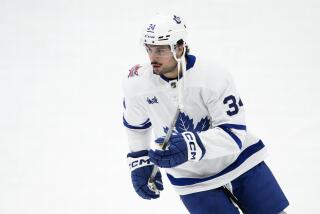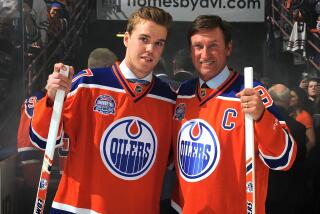Carrying the Flag
- Share via
TAMPA, Fla. — Jarome Iginla is talking about his teammates, again, in another love-fest news conference. Yadayadayada.
Now he’s gushing over the Calgary Flames’ fans. Yeah, they’re great, we know, we know.
Moving on, he’s thanking the media ... wait, thanking the media?
Finally, someone in the pack poses a pointed question.
You have the reputation of being a really nice guy, is that something your colleagues rib you about?
Iginla laughs and answers, “I don’t think they think I am a nice guy.” And for the first time in the Stanley Cup finals, no one believes a word Iginla is saying. Too many incidents betray him.
Case in point: In April, on the eve of Game 7 against Vancouver, Iginla was leaving a restaurant, smack dab in enemy territory, having just finished dinner with teammates. A young boy attending a wedding reception in the restaurant hollered, “Goodbye, Jarome, good luck.” Iginla joined the group, spending several minutes schmoozing the crowd.
This is the hope of hockey, or so goes the buzz at the finals, which continue tonight with Calgary and Tampa Bay tied at 2-2.
The Iginla swell arrives at a time when hockey seems beached. Attendance in many cities is down. Television revenues have evaporated. And the 800-pound goon lurking around the finals is the labor unrest that seems to have the league rushing toward a September lockout.
Someone has to save the NHL, even from itself. That’s a lot to put on a 26-year-old from Edmonton, but his are broad shoulders.
“Without a doubt, he can be the face of hockey,” said ESPN analyst Barry Melrose, who coached Wayne Gretzky, the last NHL player to defy marketing road blocks in the United States.
“Jarome loves the game. Everybody in the game likes him. You feel he is genuine. There is nothing artificial about anything he says or does. He’s a lot like Gretzky.”
Melrose paused, smiled, and added, “Now if we can just get him out of Calgary.”
*
At the 2002 Olympics, two university students traveled from Calgary to Salt Lake City but were unable to find accommodations. By chance, they met Iginla in a restaurant and he immediately went out and found them a hotel room.
“As much success as he has had, he goes out of his way to say, ‘Hi,’ to people,” said Tampa Bay Lighting center Martin St. Louis, who played two seasons with Iginla in Calgary. “That’s one thing beyond hockey that as a person you want to copy.”
Iginla’s appeal is only partly based on personality. There are a lot of nice guys in hockey, but few possess Iginla’s skills, as his 12 playoff goals this season attest. He has been compared to Gordie Howe, with the ability to dance around players or go bull-like to the net.
“On the surface, Jarome is the kind of guy that hockey has been looking for,” said Paul Swangard, managing director of the Warsaw Sports Marketing Center.
“The challenge for hockey is that most guys have it drilled into their heads that it’s a team game and no one should emerge bigger than anyone else. Clearly in American sports culture, superstars are what make the difference between a few people paying attention and a lot of people paying attention.”
Gretzky demonstrated that, taking the NHL to a higher plane in the U.S. when he was traded to the Kings in 1988, opening up the sunbelt to hockey.
Could Iginla be USA-bound to prevent the NHL from going south? It remains unlikely that Flame officials will allow that to happen. Still ...
Iginla’s contract is up this summer, making him a restricted free agent under the current collective bargaining agreement, meaning the Flames can match any offer. But Iginla made $7.5 million this season, nearly one-fourth of Calgary’s $32-million payroll.
“I have always enjoyed playing in Calgary,” Iginla said. “It has been a rebuilding process and I wanted to be here when we turned the corner. I thought I might get traded and not be able to look back with the guys on how far we have come.”
While NHL officials would never push for Iginla to leave Calgary for a team based in the U.S., it’s doubtful they would have a problem should he cross the border. His rise during the playoffs could help generate interest in the league and, as a black athlete, he might tap into a dormant fan base, experts say.
Iginla, whose father is from Nigeria and whose Canadian mother is white, was among 14 black or mixed-race players in the NHL this season. With an engaging personality and obvious talent -- 128 goals the last three seasons, the most in the NHL -- Iginla could have mass appeal, many have speculated.
“Jarome has a lot dimensions that hockey is looking for,” Swangard said. “He’s a great person and a great player and it doesn’t hurt that he is a minority.”
Iginla never shies from questions about being a black hockey player, having answered them his whole life. He started playing hockey at 7, in Edmonton, where Gretzky was royalty.
Yet Iginla had other role models, those that comforted him.
“I loved the Oilers, so I loved Wayne Gretzky,” said Iginla, who is the first black team captain in NHL history.
“Other kids, not trying to be mean, would say, ‘Well, there are not that many black players in the NHL. What are the chances?’ It was nice to say, ‘Look at Grant Fuhr winning his Stanley Cups and Claude Vilgrain scoring 30 goals and Tony McKegney scoring 40 goals.’ There weren’t many, but you could see it was possible.”
*
Canada has already been won over. Iginla’s two-goal performance in the victory over the U.S. in the gold medal game of the 2002 Olympics sealed the deal.
“He’s bigger than life in Canada,” Flame center Craig Conroy said. “We’ve got to get the people in the United States to know him.... If we can get him in the U.S. market, it can do wonders for hockey.
“We need to get people to say, ‘Jarome Iginla’s in town and we need to see him.’ ”
Whether that can be accomplished at a time when the NHL seems headed to rock bottom remains to be seen.
New television deals with ESPN and NBC seem to have devalued the league, both in terms of cash and prestige. Stalled labor negotiations -- the current agreement expires in September -- darken an already murky picture.
“In a perfect world, you would like to see Jarome go right back into a season in three months,” Swangard said. “I don’t think that is going to happen.”
Iginla’s resume is worth promoting. He is active in charities to help kids and also has a youth hockey school. That has brought praise from hockey highest peak.
Talking about Iginla’s participation in an Edmonton charity event last summer, Gretzky said: “Jarome exceeded expectations. He has all the time in the world for fans and that’s such an important part of an event like this. As a professional athlete, he is a great role model.”
Iginla’s answer to the praise was typically diplomatic and sincere.
“I’d be comfortable, as with other players, trying to help this grow,” he said. “I mean, it’s a great game. If there is any way to help promote the game, I’d love to do that.”
Iginla is already the face of the Flames, who are in the finals after missing the playoffs the last seven seasons, and many believe it’s time for him to go global.
“They say there’s no Gretzky or [Mario] Lemieux, but look at Iggy and the way he plays,” Flame forward Chris Simon said. “He fights, scores 40 goals, does everything. How can you not start looking at him to take over for those guys?”
*
(BEGIN TEXT OF INFOBOX)
Hot Commodity
A look at Calgary’s Jarome Iginla:
* Position: Right wing.
* Hometown: Edmonton, Canada.
* Age: 26.
* Drafted: Dallas’s 1st choice, 11th overall, in 1995 entry draft.
* Acquired: Trade with Dallas on Dec. 19, 1995 with Corey Millen for Joe Nieuwendyk.
* Playoff stats: 12 goals, 8 assists.
* Regular-season stats: 41 goals, 32 assists.
More to Read
Go beyond the scoreboard
Get the latest on L.A.'s teams in the daily Sports Report newsletter.
You may occasionally receive promotional content from the Los Angeles Times.







